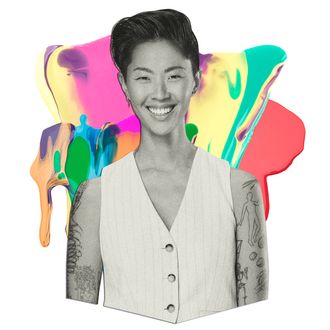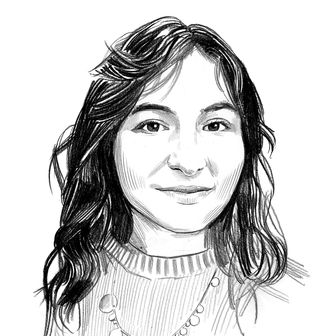
Last year, after nearly two decades of hosting Bravo’s Emmy-winning competition show Top Chef, Padma Lakshmi passed the reins to season-ten winner Kristen Kish. Kish, who first entered the competition in 2012 at the urging of her then-boss, chef Barbara Lynch, was eliminated early on. But she clawed her way back via the show’s redemption spinoff and claimed victory in a dramatic live finale episode with four seafood-heavy courses.
“Competing on Top Chef was a nerve-racking experience,” Kish says. “I never wanted to be on television, and living in a house with 17 other chefs is not how I relax.” After winning her season, Kish moved from Lynch’s demonstration kitchen, Stir, to the chef’s Boston restaurant, Menton. Then in 2018, she opened her own restaurant in Austin: Arlo Grey.
Meanwhile, she steadily built a career straddling the food and entertainment worlds: Co-hosting an Iron Chef spinoff with fellow chef Alton Brown and martial artist Mark Dacascos, filming her own National Geographic show about remote restaurants, and returning to Top Chef’s more recent seasons as a guest judge. “I’m only comfortable now because it’s familiar,” says Kish, who now works alongside many of the same judges and the crew members who’ve been on the show since she competed herself.
Kish spends at least half the year traveling in some capacity, whether that’s tending to Arlo Grey or shooting in otherworldly locations like Panama’s Cloud Forest. Last year, she spent eight weeks in Milwaukee filming her first-ever season as Top Chef’s host, which premieres March 20. Her home base is just outside New York City, where she lives with her wife. Here’s how she gets it done.
On her morning routine:
On average, I’m up at seven. I try to do at minimum a pint of lemon water, but if I can’t, just water. From there, I go right to coffee. My schedule is not consistent, so my morning routine is the only routine in my day that remains constant no matter where I am or what I’m doing. When I’m filming, it sometimes starts before the sun comes up. I like to wake up at least an hour and a half earlier than I have to be ready, because I’m a natural-born introvert and I require time to recharge. I look at my phone and answer emails.
On trying to bulk up:
I like to work out when I’m able. I just sometimes don’t have motivation. I always wanted to be a good runner; I’m okay, I can run. But while I was in Milwaukee filming Top Chef, because I was in one place for nearly eight weeks, I got a personal trainer. The goal was functional movement and lifting heavy weights to put muscle on my frame. Which is really hard, by the way. Running’s easy because I’m running to clear my mind, for my mental health. Muscle-building is very intentional, and there’s a lot of things involved that I am not very good at — meaning I like to eat what I like to eat, and it’s not necessarily muscle-building food.
On the treat that gets her through the day:
I know it’s not good for me, which is why I go see a personal trainer, but I love gummy candy. In between takes, in between sets, my on-set coordinator brings out candy and I have a couple little pieces. It’s like comfort.
On getting paid:
The least I’ve been paid is zero. As chefs, we often donate our time and resources and food to really great causes, which I’m happy to do. The most I’ve ever been paid for a job? Enough to pay my bills. I’ll put this into context: Pre–Top Chef (my season ended in 2013), I was making not a lot of money as a chef, and before that not a lot of money as a cook on hourly pay. So I’m kind of new to this idea of being paid what I’m worth. It’s hard to speak up for yourself. I am not the most comfortable talking about money. When it comes to advocating for what you are owed, I relied heavily on other people to push for me, which was a great resource.
On celebrating her accomplishments:
My job takes me on the road and I’m around a lot of people, so I really do value my time at home with my wife. Some of our celebrations are just, like, We’re gonna get takeout tonight because no one wants to cook. I also like to mark high moments of my career with tattoos. I recently got one to mark my very first season of Top Chef. I’m running out of room.
On learning to set aside her ego:
When I opened my own restaurant in 2018, my first couple menus were trying to impress. I was in a rush to be successful. I wish I’d known that I didn’t have to be like another successful person; I had to define what that meant for me. I don’t want to say that first year and a half was a failure, because there were a lot of great people who worked their asses off to make it not a failure. But on a personal level, I was pulling from ego rather than an authentic storytelling place. I thought I had to use my ego in order to create the “best” food. For me, cooking to impress actually inhibited me from finding my voice.
On balancing two demanding careers:
After Top Chef, I went back to my job and then got promoted to run another restaurant, and these television opportunities got presented to me. I said no to a lot of them, but said yes to some, and a few of those really took me away from the restaurant. When I look back on it now, that was a mistake. I failed my team because I wasn’t present for them. I would feel the same way if all of a sudden my boss went on TV and they weren’t with us in the restaurant. That was certainly a learning curve for me of prioritizing the right things and understanding what people need from you.
On the people who help her get it done:
There’s no way I could remotely be good at any of my jobs if there weren’t a team of people around me. On TV shows, there are on-set assistants and coordinators making sure you get from Point A to Point B and your day goes as smoothly as possible. My managers and publicists keep everything organized so I can focus on conversations, rather than trying to figure out where the next Zoom link is. I have someone that helps me collect packages and people who stay at the house when we’re not home. My wife doesn’t work for me, but she’s by far my biggest support system, whether that’s mentally or for actual logistics.
On letting success come to her:
I try not to control the outcome of where I’m pushing my ambition. That’s the beauty of having really great people around you to help point you in the right direction. My job went from working in restaurants to being on Top Chef because my boss at the time was like, We need more women on television. Go represent. I know you can do this. I rely heavily on my wife and my inner circle to help me navigate what I should be pushing for. They rev me into this space of being, like, Fuck yeah, I can do this. I trust a lot of people to help me see the path ahead of me.


